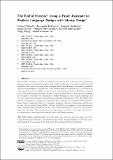Notice
This is not the latest version of this item. The latest version can be found at:https://dspace.mit.edu/handle/1721.1/128880.2
The end of history? Using a proof assistant to replace language design with library design
| dc.contributor.author | Chlipala, Adam | |
| dc.contributor.author | Delaware, Benjamin | |
| dc.contributor.author | Duchovni, Samuel | |
| dc.contributor.author | Gross, Jason S. | |
| dc.contributor.author | Pit-Claudel, Clement Francois | |
| dc.contributor.author | Suriyakarn, Sorawit | |
| dc.contributor.author | Wang, Peng | |
| dc.date.accessioned | 2020-12-21T20:37:27Z | |
| dc.date.available | 2020-12-21T20:37:27Z | |
| dc.date.issued | 2017-05 | |
| dc.date.submitted | 2017-03 | |
| dc.identifier.uri | https://hdl.handle.net/1721.1/128880 | |
| dc.description.abstract | Functionality of software systems has exploded in part because of advances in programming language support for packaging reusable functionality as libraries. Developers benefit from the uniformity that comes of exposing many interfaces in the same language, as opposed to stringing together hodgepodges of command-line tools. Domain-specific languages may be viewed as an evolution of the power of reusable interfaces, when those interfaces become so flexible as to deserve to be called programming languages. However, common approaches to domain-specific languages give up many of the hard-won advantages of library-building in a rich common language, and even the traditional approach poses significant challenges in learning new APIs. We suggest that instead of continuing to develop new domain-specific languages, our community should embrace library-based ecosystems within very expressive languages that mix programming and theorem proving. Our prototype framework Fiat, a library for the Coq proof assistant, turns languages into easily comprehensible libraries via the key idea of modularizing functionality and performance away from each other, the former via macros that desugar into higher-order logic and the latter via optimization scripts that derive efficient code from logical programs. | en_US |
| dc.description.sponsorship | NSF (Grants CCF-1253229, CCF-1512611 and CCF-1521584) | en_US |
| dc.description.sponsorship | DARPA (Contracts FA8750-12-2-0293 and FA8750-16-C-0007) | en_US |
| dc.language.iso | en | |
| dc.publisher | Dagstuhl Research | en_US |
| dc.relation.isversionof | http://dx.doi.org/10.4230/LIPIcs.SNAPL.2017.3 | en_US |
| dc.rights | Creative Commons Attribution 4.0 International license | en_US |
| dc.rights.uri | http://creativecommons.org/licenses/by-nc-nd/4.0/ | en_US |
| dc.source | DROPS | en_US |
| dc.title | The end of history? Using a proof assistant to replace language design with library design | en_US |
| dc.type | Article | en_US |
| dc.identifier.citation | Chlipala, Adam et al. "The end of history? Using a proof assistant to replace language design with library design." 2nd Summit on Advances in Programming Languages, May 2017, Asilomar, California, Dagstuhl Research, May 2017. © 2017 The Authors | en_US |
| dc.contributor.department | Massachusetts Institute of Technology. Computer Science and Artificial Intelligence Laboratory | en_US |
| dc.relation.journal | 2nd Summit on Advances in Programming Languages | en_US |
| dc.eprint.version | Final published version | en_US |
| dc.type.uri | http://purl.org/eprint/type/ConferencePaper | en_US |
| eprint.status | http://purl.org/eprint/status/NonPeerReviewed | en_US |
| dc.date.updated | 2019-05-13T17:46:41Z | |
| dspace.date.submission | 2019-05-13T17:46:42Z | |
| mit.metadata.status | Authority Work and Publication Information Needed |
